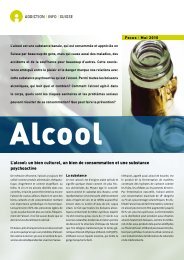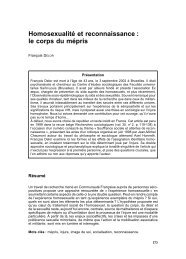Care and support for people living with HIV/AIDS
Care and support for people living with HIV/AIDS
Care and support for people living with HIV/AIDS
Create successful ePaper yourself
Turn your PDF publications into a flip-book with our unique Google optimized e-Paper software.
Report on the global <strong>HIV</strong>/<strong>AIDS</strong> epidemic – June 2000Fear, stigma <strong>and</strong> denial: a vicious circleWarnings about the growing threat of <strong>HIV</strong> <strong>and</strong> <strong>AIDS</strong> date back to the early <strong>and</strong> mid-1980s. But many <strong>people</strong>, from members of affected communities to leaders ofglobal organizations, have failed to take them seriously. In some cases, the denialhas been deliberate. People simply do not want to admit that a fatal disease spreadby behaviour br<strong>and</strong>ed as “immoral” could be rampaging through their community ortheir country.Other unique features of <strong>AIDS</strong> aid <strong>and</strong> abet denial. The behaviours that spread <strong>HIV</strong>take place in private. There is a lag time of up to a decade <strong>and</strong> more between infection<strong>and</strong> any visible sign of illness. <strong>HIV</strong> does not cause a single, specific fatal disease;instead, individuals whose immune system has been weakened by the virusfall prey to infections <strong>and</strong> ailments that may look familiar in their community. Inother words, <strong>people</strong> who do not want to accept the reality or gravity of <strong>AIDS</strong> canfind all sorts of ways of questioning whether it is as bad as the data from surveillancesuggest.A country in which denial flourishes is a country whose citizens are vulnerable tothe silent spread of <strong>HIV</strong>. Until political figures <strong>and</strong> respected community leadersspeak out <strong>and</strong> breach the wall of silence, there is little hope of mounting a vigorous,broad-based ef<strong>for</strong>t against the epidemic (see pages 108-109). Fortunately,the past year has seen major progress at the highest level of political leadership(see Box 6 below).Box 6. Breaking the silence in AfricaNearly a decade ago, a few bricks were chipped out of the wall of silence erected bypolitical leaders around the fearful subject of <strong>AIDS</strong> in Africa. That was when Ug<strong>and</strong>anPresident Yoweri Museveni, faced <strong>with</strong> rising sickness <strong>and</strong> death in his country,reversed his long-st<strong>and</strong>ing opposition to condoms <strong>and</strong> began talking openly about<strong>AIDS</strong>. The subsequent national response helped bring about a significant fall in theprevalence of <strong>HIV</strong> infection in the country, described on pages 9-10.Public acknowledgement of the existence <strong>and</strong> danger of <strong>AIDS</strong> gathered momentum<strong>with</strong> an event that electrified Mozambique last year: the announcement that BoaventuraMachel, the brother of Mozambique’s independence hero <strong>and</strong> first president, had diedof <strong>AIDS</strong>. In Blantyre, Malawi’s president Bakili Muluzi invited a cross-section of society,including soldiers, schoolchildren, prostitutes <strong>and</strong> <strong>HIV</strong>-infected persons, to the launchof a new five-year plan against <strong>AIDS</strong>.A clarion call <strong>for</strong> greater openness had already been sounded by South AfricanPresident Thabo Mbeki. “For too long we have closed our eyes as a nation, hoping thetruth was not so real,” the then Deputy President Mbeki told South Africans in 1998.–––>38











